In and Out of Africa
Elephants Galore
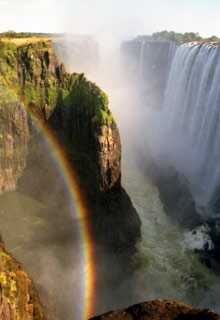 |
| Victoria Falls |
|---|
The border between the two countries is physically halfway across the bridge over the Zambezi and there is a spectacular view. Once again stopping on the bridge was more than a little frowned upon. On the Zimbabwe side they assumed that our Cholera certificate must be up to date as we had already been through Zambia. However our Nigerian insurance papers caused suspicion for the first time since we had bought them. "This insurance is no good", the lady said. It was very difficult to argue the point as she was probably right. She had a list of approved insurance companies and not surprisingly the Nigerian company wasn't on the list. Curiously the one British company which would have even considered insuring a vehicle for African travel (at a rather large premium) was also missing from the list, which would have annoyed us greatly had we actually bought insurance from them. As well as being the first country which wouldn't accept our insurance this was also the first country since Niger which would sell us insurance at the border. It cost us US $6.50 for 30 days, which seemed reasonable, although we did try and buy only a weeks worth!.
We intended to visit the falls on the Zimbabwe side straight away. However it cost Zim $5 each to enter and we had no local currency. The black market here was not hard to find, in fact it found you. Even in the falls car park several people casually walked past us and whispered "Change money, best rate". We had been warned not to change money at the falls as one of these people is apparently working with the police. After we arrived in town Heather decided to seek out the black market there. She didn't have a truck to lose if caught and we could bail her out or at least inform her parents. In countries where there was a currency declaration form, which was the majority, we always changed at least some money officially to get a stamp on the form. Although we had managed to get through Zambia with only some money we had bought from travellers going the other way. Somehow swapping currency with other travellers didn't seem the same as dealing on the black market.
The campsite was very expensive by African standards, nearly as expensive as the one in the Ngorogoro crater. There was another campsite a little further out of town so we decided to try there. It was run by the same people and cost exactly the same price so we drove back into town. The campsite was quite good although rather crowded and we were unused to being surrounded by so many noisy tourists. The afternoon sun was hot and we sit around lazily for the rest of the afternoon. That evening Heather offered to buy us dinner at the Victoria Falls hotel in return for giving her a lift. The hotel is still rather regal and the buffet dinner in such opulent surroundings is evocative of the height of colonialism. The food was excellent and very good value, as much as you can eat and all of it good, especially the dessert course. Every half starved traveller should take this opportunity to eat like Cecil Rhodes and you don't even have to get dressed up! Replete with food and wine we eventually strolled back to the campsite and the sound sleep of the well fed.
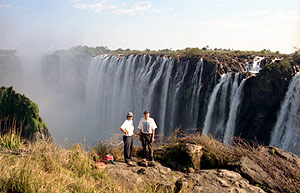 |
| Derek and Fiona at Victoria Falls |
|---|
The Zimbabwe side also has the better tourist shops, an artisans market and other souvenir shops. As well as 'T' shirts with such things as 'Zimbabwe Crocodile Attack' printed on them (this one had torn teeth marks and red 'blood stains'), there were soapstone sculptures and such gruesome artefacts as elephant foot umbrella stands and antelope foot ashtrays. Ivory objects were also very common here, although it is illegal to import them into almost every other country in the world. In contrast to the rest of Africa, where the elephant has been hunted almost to extinction, Southern Africa has more elephant than it can sustain. There are so many elephant that the gamekeepers have to regularly cull the herds to avoid over-grazing. The Zimbabwe government has been trying to negotiate an exception to the ban on ivory products to allow them to use the revenue generated to help preserve other wildlife. This would also lower the price of ivory on the open market and reduce the pressure from poaching of elephants in other parts of Africa. Who would have imagined that buying a hideous elephant foot umbrella stand in Zimbabwe may save the life of an elephant in Kenya. Perhaps the situation is even more complex still, which may explain why ivory is a prohibited import even if it originates from Zimbabwe.
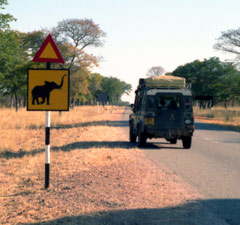 |
| Elephant crossing sign |
|---|
The campsite was full of South Africans, it was a long weekend break there and Hwange was just close enough to drive for the weekend, if you drive like a South African that is. Zimbabwe had only really become open for South African tourists very recently and they were making the most of it. They all had small trailers attached to their cars which contained all their camping equipment and food. One of these trailers was open and there were my old foes, baboons, helping themselves to South African delicacies. I ran over, chased them away and closed the trailer, thinking it was very foolish of them to leave an open trailer in a wildlife park. We started preparing our evening meal and there was a loud bang and crash from over by the trailer. The baboons had opened the trailer again and were once more helping themselves to the food. I chased them off again, collected up as much food as I could find and which didn't have teeth marks, put it back in the trailer and looped the padlock through the latch. I didn't lock it in case the idiots had left the keys inside. One of the local employees was walking past. I gave him a 'why didn't you chase the baboons off' look. He seemed to know what I was thinking. "I told them to lock the trailer from the baboons. They did not listen". I could almost imagine it. A black man tells a white South African to lock his trailer because a wild animal will open it and steal his food. In his arrogance he would choose to leave the trailer open. For a moment I felt tempted to open the trailer and call the animal back. I shook my head, shrugged my shoulders and said "idiots". The man smiled.
I didn't sleep very well that night. My tooth, which had been twinging slightly for a couple of days decided to erupt into full blown toothache. At about 05:30 in the morning, just before dawn, one of my brief moments of sleep was disturbed by a rattling noise by the fence. I immediately assumed that baboons were busy stealing something and did my best official baboon frightening noises. These were extremely effective in frightening the large antelope which had somehow got inside the campsite fence. The terrified animal leapt over the tent next to us, it's hind legs punching through the canvas and the sleeping people within. Two South Africans rapidly leapt out of the tent. Miraculously the animals hooves had landed between the sleeping bodies and the only damage was three large holes in the tent. They had come here to get close to nature and had come much closer than they expected. We were very glad our tent was well off the ground and in no danger from stampeding antelopes.
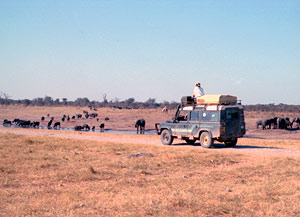 |
| Heather watching elephants from the top of the truck |
|---|
In the morning we headed into the park for a game drive. There were several official park Landrovers, with open roofs for all round vision. It was getting a little cramped in the front of the Landrover and the person in the centre didn't get a very good view so Heather decided to sit on the roofrack. She therefore had perfect all round vision and was official animal spotter. Only a few minutes into the park and there was an excited banging on the roof. "elephant!" she cried. A large herd of these magnificent beasts ambled past, with the babies in the centre for protection. They were walking to one of the 'pans'. A pan is a small pool or water hole where animals can drink. These were originally formed when the animals made a small water hole deeper by trampling and wallowing in it. This in turn allows more water to collect and eventually a large area of water, or pan, forms. To help sustain the large volume of animals contained within the park area boreholes have been sunk and several artificial pans have been made, usually close to the natural pans. This means that there is still water at the height of the dry season when all but the largest natural pans are dry. Now the rainy season had only just ended and there was plenty of water for the animals to play in. Because of this Hwange is an almost ideal game park, especially in the dry season, as it is possible to simply station yourself at a pan and sit for the whole day watching each species in turn come down to the water to drink. The park is well stocked with game animals including kudu (the antelope which trampled the tent), wildebeest, warthogs, zebra, lion, sable antelope, rhino, springbok and giraffe. A giraffe walking across the plains is a tall and elegant creature, master of all she surveys. When they stop to drink they are transformed into one of the most comical sights in nature. They splay their front legs apart to an almost impossible angle, and then lower that long neck into the water. This is the only way they can get their heads close enough to the water to drink. Even more comical is watching a pair of giraffes fighting. They stand next to each other and take turns to swing their heads through an arc into the flank of the other giraffe. They can get a lot of momentum into this swing and the loud thwack can be heard from half a kilometre away.
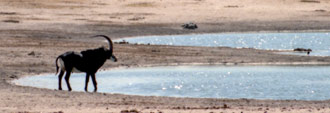 |
| Sable antelope |
|---|
 |
| Elephants |
|---|
Eventually it was time to return to camp. We drove up to the exit gate and the guard stopped us. He was very angry. "You are under charge", he shouted. At first I thought we hadn't paid or something, then I realised he meant that we were in really bad trouble. We couldn't understand why or what we had done. I had got out of the truck once to take a photograph with elephants in the background but surely no one saw me. Heather is still on top of the truck, trying to look inconspicuous. The guard has still not told us what is wrong. "I'm very sorry could you tell us what is wrong", I said politely, inwardly confused, frustrated and becoming angry myself. "You are arguing, do not argue with me, you are UNDER CHARGE". "I am not arguing", I replied, trying my best not to sound argumentative. Meanwhile Heather climbed down from the roof. "You must not ride outside the vehicle!", he said after she got down. "It is forbidden, you are under charge". Heather got in the truck. We were very uncertain about exactly where we stood. We were apparently 'under charge', although he never actually told us why, neither did he ask Heather to get down. Expecting the police to arrive at any moment I stayed where I was and several other vehicles were now behind me. "Why are you stopped, go through the gate" the guard shouted impatiently. I quickly drove through the gate. Several cars behind us the people who had been sitting on a mattress in the back of an open truck were quietly getting into the cab... Once again a confrontation situation occurred through little fault of our own, nowhere had it stated that riding on top of a vehicle was forbidden, and the situation had escalated because the guard had not attempted to tell us what he expected us to do. He then assumed we were arguing because Heather hadn't instantly gotten down off the roof. It was almost as though they welcomed these situations as a chance to shout at foreign tourists and show their power. Fortunately this kind of situation was rare throughout our trip. Normally we avoided these situations by being polite and friendly. Here it seemed that no matter how we behaved we would be treated as unwelcome by anyone who felt they had the slightest amount of power.
After a meal of nice soft burgers and chips I retired to bed with some antibiotics and paracetamol/codeine tablets to ease my toothache. Fiona and Heather went to the bar and sat around drinking with some South Africans and Germans from a Rotel which had pulled up. A Rotel is a peculiarly German form of travel, a bit like a moving hotel. The front is a fairly normal luxury air conditioned coach, Behind this is a large trailer the same size as the coach. The trailer has three rows of little windows on top of each other. Each room being little more than a bed with just enough room one German tourist. There were apparently double 'rooms' as well which had just enough room for two German tourists but no extra room for 'movement' once they were inside. The 'rooms' are so reminiscent of Egyptian Sarcophagi that Rotel coaches are known as 'Mummy Wagons'. As I lay in agony listening to the sounds of partying Germans, singing and joking into the night, I began to wish the passengers really were mummified.
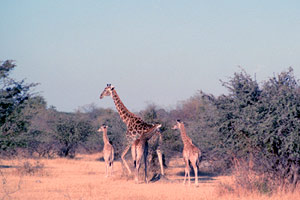 |
| Giraffe |
|---|
A couple of hours freezing and shivering is not the best way to avoid the rigours of toothache and my tooth was now hurting so badly that I couldn't concentrate on driving. I spent the journey to Bulawayo lying in the back of the truck and being generally miserable. The road was very smooth and flat, in fact it was straight and flat to the point of boredom. There is very little more boring than driving a vehicle at 110 km/h along a straight flat road and I don't think Fiona enjoyed the drive very much. At least I wasn't being bounced around in the back.
Bulawayo is a well maintained and attractive town, very reminiscent of several small towns in New Zealand. The buildings and old Ford Anglias completed the picture of a quiet rural backwater at home and I found myself feeling very homesick. At the train station we try and book a ticket for Heather on tomorrow's train. It is impossible to book a ticket, tickets and seats are all on a first come first served basis on the day the train runs. At the post office we try and phone Pete in South Africa to tell him we may be arriving in the next couple of days. The phones either don't work at all or consume our money with no return. When we eventually get through to the Anglo American switch board and ask for Pete we are cut off. In the end we give up. Perhaps we are still in Africa after all.
The campsite was one of the best we had stayed at with running water, grass to pitch the tent on and little barbecue areas. We decide to go and eat in town at Buffalo Bills and sit talking in the bar with some Australians Heather met in Lilongwe. After another filling meal we walked home, avoiding the really dark alley into the campsite taking the equally dark road around the side instead. The antibiotics were beginning to work and whatever infection I had in my gums was beginning to abate. A successful piece of self diagnosis on our part and I managed a reasonably good nights sleep.
In the morning we dropped Heather off at a hotel near to the station. she had decided to stay in Bulawayo for another day before attempting to catch a train. Another sad parting with a fellow traveller, perhaps we will meet again in New Zealand one day. On the way out of town we stopped at a small shop called the 'Bakers Inn' which sold pies and bread and other baked goodies to take away. Civilisation seemed to be breaking out all over the place.
The road to the South African border was another uneventful smooth tar sealed road. The border between Zimbabwe and South Africa is at Beit Bridge, named after one of the great diamond barons. The bridge crosses the 'Great grey green greasy Limpopo, all set about with fever trees'. The lines from the story of the curious elephant who lost his trunk, so familiar from childhood. I wanted to stop on the bridge and look for fever trees, I had always wondered what one looked like. Once again stopping on the bridge was prohibited. This time by South African guards with some of the biggest and cleanest guns we had seen. I didn't stop.
The South African border post is much more like the standard vision of a border post, with a clean office, regular well ordered queues and clearly written signs in several languages. If you ignored the bullet proof glass and the models of terrorist weapons on the wall that is. Our details were processed by computer, which took a surprisingly long time and a bar coded entry sticker placed in our passports, the stamp only touching the sticker so we could remove all evidence that we had been in South Africa once we left if we so wished. The vehicle searches were run by very professional looking soldiers. They didn't search us however as we didn't look at all like terrorists!
We reach the campsite at Louis Trichard tired and hungry. We had just had our second argument of the trip. This time about what to do at a novel new road junction called a four way stop. In other parts of Africa we hadn't cared very much about traffic rules as everyone else ignored them anyway. Here there were other trappings of civilisation like police patrol cars. Basically all four roads have a compulsory stop sign at them, the question was did we really have to stop and who has right of way. The argument was really about being tired after a long day and wanting to stop travelling. In the end it turned out we were both right anyway, although Fiona was probably more right than I was. The campsite looked fairly modern and well organised, each town in South Africa seems to have a very well run municipal campsite and in general campsites here rival the best in the world. Unfortunately the attendant wanted payment in advance and we didn't have any Rand. It took several minutes of persuasion to convince him to let us stay for the night and pay in the morning. When we finally found a spot to park all we wanted was to be left alone to rest. Instead we were beset by hordes of friendly but curious Afrikaaner campers. "I saw your Landrover and I was wondering, where are your plates from". "They are British plates". "How did you get it here, by boat?". "No we drove down from Europe". "Which countries did you go through...". The South Africans seemed to have as much difficulty in believing that we had driven all this way as any other group of people we had come across. Very few overland travellers have come to South Africa over the years of sanctions and we were rather a novelty item. To make matters worse one of them used to own a Landrover and it was nearly an hour before we could make ourselves something to eat and make one last attempt to call Pete. Of course we had no change for the telephone now. So I called collect. This time I finally got through. "Hello, it's Derek here, we're in Louis Tritchard can we come and stay for a while?".
The night in Louis Tritchard was the coldest we'd had since France, hopefully Pete has a warm house. As we leave the campsite for the bank the attendant eyes us with suspicion, he is not sure if we should be allowed to leave until we pay. Next to the bank there is a shop with all manner of dried meat called Biltong hanging in the window. As well as beef you could have gemsbok, kudu or several other game animals. I felt rather hesitant at the thought of eating such a magnificent beast as an antelope. After all, cows aren't particularly inspiring and neither are sheep, eating antelope wouldn't be the same. We avoided, or perhaps postponed this issue by going into the bank. The lady took a very long time over cashing the travellers cheques, partly because of the lengthy paper work involved and partly because I think these were the first travellers cheques she had ever seen. When she had finally finished we didn't seem to have anything like as much money as we had expected. We checked the receipt and discovered that she had used the exchange rate for US dollars instead of Pounds Sterling. Eventually we returned to the campsite. The attendant had given up and wandered off somewhere. When we found him he was more than a little surprised that we had gone back. Perhaps he will be more trusting of foreign travellers in future.
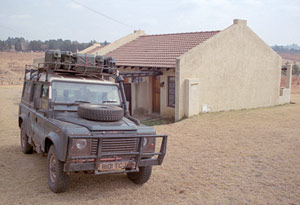 |
| Truck at Pete and Michelle's house |
|---|



